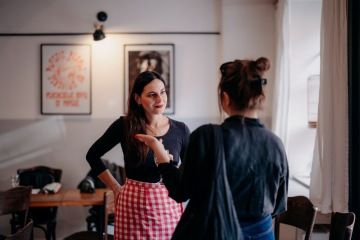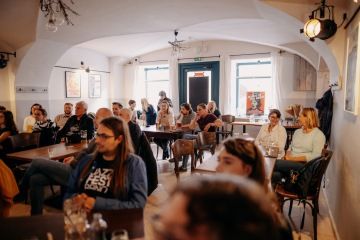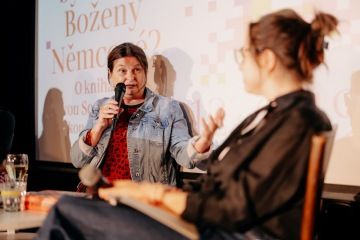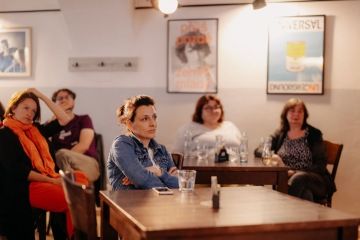DO YOU FEEL LIKE WRITING?
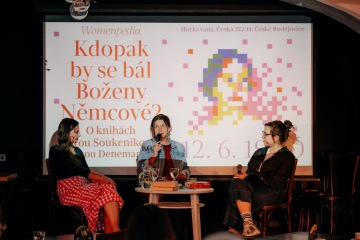
Do you feel like writing?
Womanpedia also focuses on extraordinary human encounters, and one such event took place during a discussion with the writer Radka Denemarková. It was just before midnight when Marie, one of the discussion participants and a long-time friend of the author, asked her, "Do you feel like writing?" She was referring to signing the book Chocolate Blood, which each of us in our small circle had on our laps, but her words resonated much more than expected, and we all burst into laughter. Asking a writer such a question carries an almost existential weight. At the same time, it encapsulated the essence of the debate, which was moderated by Czech Radio journalist Eva Soukeníková. We discussed not only the act of writing itself but also Božena Němcová and the courage to speak about sensitive and often uncomfortable topics.
In an earlier interview, Denemarková mentioned that her books are like "a bone stuck in the throat." Money from Hitler shocks with the cruelty one person can inflict on another, while in Hours of Lead, she portrays the lives of people in extreme situations, forcing them to choose between resignation or the desire to live again. The only thing left is the courage for everyday life, which is far from guaranteed. Denemarková's latest novel, Chocolate Blood, which was the main focus of the discussion in České Budějovice, opens up topics of personal freedom, the power of money, and the difficulty of facing the prejudiced expectations of bourgeois society. In it, Denemarková writes openly about Božena Němcová's sexuality and her menstruation, bringing the "national writer" back down to earth.
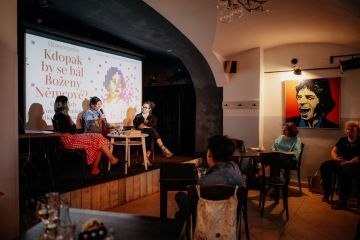
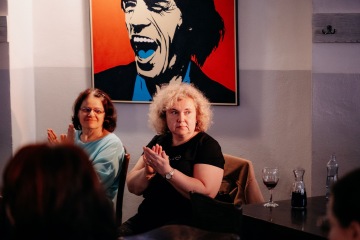
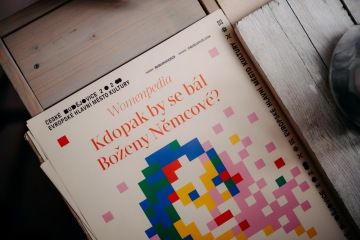
As Denemarková noted, we haven’t come far, and similar mechanisms of power and bourgeois hypocrisy are still relevant today. Němcová was celebrated as a patriot and national artist, yet she often didn’t have enough to eat and died of starvation. Her patriotic works were the most praised, but her letters, where she allowed herself to write freely, are her strongest literary pieces. Her French contemporary, the writer George Sand, had a much easier time due to her social standing, allowing her to behave eccentrically and write openly. However, even her work was subject to criticism, and she was often judged by the characters in her books. Denemarková herself often faces criticism, yet during the discussion, she tried to show that her books are not moralizing; rather, her protagonists hold up a mirror to us and encourage self-reflection. In Chocolate Blood, as well as in her earlier works, the theme of freedom is prominent, whether in the context of writing, the conditions under which literature is created, or the space in which it resonates. As the debate highlighted, freedom is inherently fragile and uncertain, and it remains essential to continually discuss and write about it today.
Radka Denemarková is one of the most successful Czech authors, having gained international recognition. She is a four-time winner of the Magnesia Litera awards: twice for original prose, with Money from Hitler (2007) and Hours of Lead (2019); once for nonfiction with Death, You Shall Not Be Afraid, or the Story of Petr Lébl (2009); and once for her translation of The Swinging Breath (2011). She has long brought topics related to human rights and personal freedom to the literary world, and this year she received the European Award for the Support of Democracy and Human Rights 2024. In the spring, she was admitted to the German Academy for Language and Literature (Deutsche Akademie für Sprache und Dichtung). After the discussion in České Budějovice, she headed straight to Vienna to receive the Franz Kafka Odradek Award, one of Austria's most prestigious prizes, for her novel Hours of Lead.
The discussion with Radka Denemarková titled "Who’s Afraid of Božena Němcová?" took place on June 12th at the Horká Vana café in České Budějovice and was moderated by Czech Radio journalist Eva Soukeníková.
